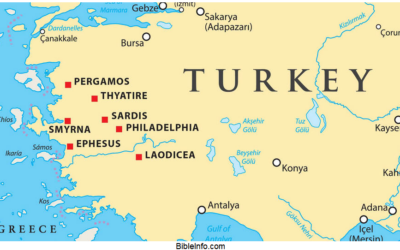The statement by Jesus at the end of the gospel of Matthew is a wonderful testimony to, among other things, God’s triune nature. But was it really originally part of the gospel, or is it a later addition? Let’s take a look at Jesus’ powerful words commissioning His disciples to ministry, and then discuss modern claims that these words are a fabrication.
“Go therefore and make disciples of all the nations, baptizing them in the name of the Father and the Son and the Holy Spirit, teaching them to observe all that I commanded you; and lo, I am with you always, even to the end of the age,” (Matthew 28:19-20).
In relatively recent years, it had become increasingly popular among modalists, Muslims, and even Black Hebrew Israelites to claim that this section, or at least the Trinitarian formula therein, was not original to Matthew’s gospel and was only added in later on. This is an entirely unfounded assertion that goes against all known evidence. We have strong reasons to believe that these words were always part of Matthew’s gospel and no legitimate reasons to doubt it.
The Manuscript Evidence
There are no known ancient manuscripts of Matthew which contain the ending of Matthew but lack this final episode or that contain it without the Trinitarian formula. Our earliest manuscripts are, of course, fragmentary in places and are missing portions of the text due to damage, but every ancient manuscript where the final pages of Matthew have survived contains the account of Jesus giving the great commission and includes the command to baptize in the name of the Father, Son, and Holy Spirit. This is not only true of the Greek manuscripts, but also of the translations of Matthew into other ancient languages. So the manuscript evidence is 100% unanimously in agreement on the ending of Matthew and on the Trinitarian formula. Any theory that wishes to assert that these words are not part of the original has to go outside of and against the actual physical evidence.
The Early Church Writings
There is secondary evidence in the earliest church writings. Our copies of such writings are typically fewer and later than our copies of actual biblical manuscripts, so the manuscripts are far more important to consider when determining the original text, but quotations from early Christian sources are still worth noting and can often provide additional insight. The Didache, considered to be one of the earliest Christian documents outside the New Testament itself, contains instructions on baptism, stating:
“Having first said all these things, baptize into the name of the Father, and of the Son, and of the Holy Spirit, in flowing water,” (Didache Chapter 7).
The Didache does not explicitly claim to be quoting the Gospel of Matthew, but it contains numerous striking parallels with Matthew that have led many scholars to suspect that Matthew’s Gospel was a primary source for the Didache. For example, the Didache contains the Lord’s Prayer almost word for word from Matthew (Didache Chapter 8, Matthew 6:9-13) and concludes with warnings about the end times (Didache Chapter 16) remarkably similar to those in Matthew 24. Even if one argues that the Didache is not citing Matthew and instead preserves the same words of Jesus independently of Matthew, it then provides us an additional witness that Jesus really did teach these things, including the Trinitarian formula in His command to baptize.
Justin Martyr, a Christian living in the region of Samaria in the early second century, also affirms that baptism in the name of the Father, Son, and Holy Spirit was the practice of the earliest churches.1 Again, Justin does not explicitly cite Matthew as his source, but this additional very early testimony of the Trinitarian formula at baptism is striking. It is also worthy of note that Justin’s student, Tatian, produced a harmony of the four Gospels into one narrative called the Diatessaron which contains the words of Matthew 28:19-20, including the Trinitarian formula.2 Thus, not only is Tatian another early witness that the words were authentically part of Matthew’s gospel, he gives us good reason to think that this is where Justin and his contemporaries derived their practice.
Even the sub-orthodox and often outright heretical “Clementine Homilies” affirm that baptism in the name of the Father, Son, and Holy Spirit was the teaching of Jesus and the practice of the early church, and do so through mixing together quotations from the canonical gospels, including Mattew 28:19.3
Irenaeus of Lyons, another important Christian writer of the second century, quotes Jesus as saying:
“Go and teach all nations, baptizing them in the name of the Father, and of the Son, and of the Holy Ghost,” (Against Heresies, Book 3, Chapter 17, Section 1).
Irenaeus, again, does not directly mention deriving this quote from Matthew’s gospel, but he does explicitly say that these were the words of Jesus. Irenaeus acknowledges only the four canonical gospels, and indeed defends the exclusivity of these four gospels a little earlier in the very same book,4 so there is no other plausible source for this quote.
Origen, a writer of the early third century, wrote probably the earliest commentary on Matthew. In it, he cites and expounds on Matthew 28, including the Trinitarian formula.5 He makes a passing reference to the passage as the “words recorded in Matthew” in his Commentary on the Book of John,6 though there he is not specific on the passage’s wording. Taken together, Origen supplies ample evidence that this text was originally part of the Gospel, and cites the passage as containing the Trinitarian formula.
Tertullian, a writer of the late second and early third centuries and the first major theologian to write in Latin rather than Greek, said:
“Accordingly, after one of these [the twelve apostles] had been struck off, He commanded the eleven others, on His departure to the Father, to ‘go and teach all nations, who were to be baptized into the Father, and into the Son, and into the Holy Ghost,'” (A Prescription Against Heretics, Chapter 20).
And elsewhere he writes:
“For the law of baptizing has been imposed, and the formula prescribed: ‘Go,’ He saith, ‘teach the nations, baptizing them into the name of the Father, and of the Son, and of the Holy Spirit, (Tertullian, On Baptism, Chapter 8)
So, the early church was filled with references to these words, always attributed to Jesus and often explicitly said to be from the Gospel of Matthew. This only reaffirms what we find in the unanimous manuscript tradition.
Eusebius
There is one source to which those wishing to expunge Jesus’ words from Matthew 28:19 will inevitably run, and that is the 4th-century Historian, Eusebius. In some of His writings, Eusebius paraphrases the Great Commission as “Go ye and make disciples of all nations in my name,” such as where he writes:
“after his victory over death, he spoke the word to his followers, and fulfilled it by the event, saying to them, ‘Go ye, and make disciples of all nations in my name.’ He it was who gave the distinct assurance, that his gospel must be preached in all the world for a testimony to all nations, and immediately verified his word: for within a little time the world itself was filled with his doctrine,” (Oration of Eusebius, Chapter 16, Section 8).
And:
“But the rest of the apostles, who had been incessantly plotted against with a view to their destruction, and had been driven out of the land of Judea, went unto all nations to preach the Gospel, relying upon the power of Christ, who had said to them, ‘Go ye and make disciples of all the nations in my name,” (Church History, Book 3, Chapter 5, Section 2).
They note that, in these instances, Eusebius quotes Jesus as saying “in my name,” rather than “in the name of the Father, and the Son, and the Holy Spirit.” They take this to mean that Eusebius’ copy of Matthew must have contained this shorter version without the Trinitarian formula. Even if this were true, it would not provide any evidence that this was the original reading, and over against the more certain manuscript tradition and the words of the earlier church writers, it would be a difficult case to make. But the situation for the anti-Trinitarian revisionists is even worse. When discussing the history of the gospel going forth to the world, Eusebius paraphrases the passage as above, keeping the focus on the command to preach to all nations. However, when discussing matters of theology, he quotes the passage more fully:
“We believe in One God, the Father Almighty, the Maker of all things visible and invisible. And in One Lord Jesus Christ, the Word of God, God from God, Light from Light, Life from Life, Son Only-begotten, first-born of every creature, before all the ages, begotten from the Father, by whom also all things were made; who for our salvation was made flesh, and lived among men, and suffered, and rose again the third day, and ascended to the Father, and will come again in glory to judge quick and dead. And we believe also in One Holy Ghost; believing each of These to be and to exist, the Father truly Father, and the Son truly Son, and the Holy Ghost truly Holy Ghost, as also our Lord, sending forth His disciples for the preaching, said, ‘Go, teach all nations, baptizing them in the Name of the Father, and of the Son, and of the Holy Ghost,'” (Eusebius’ Letter to the Church in Caesarea).
So even Eusebius knew and used the full form of the text we have today, he simply felt free to paraphrase it at times when his purpose did not require a full citation.
Conclusion
After Jesus rose from the dead, He commanded His followers to go and make disciples of all nations. He commanded them to baptize in the one, singular name of the Father, Son, and Holy Spirit, thus on the authority of the Trinity. One God, three persons. He told them to teach these new disciples from the nations all that He had commanded, and He promised to be with them always. Matthew recorded these precious words for us, and they have been powerfully preserved throughout the ages through numerous streams of evidence. If your beliefs about God and Christ cannot reconcile with these words, it is your beliefs that are in error, not the words. The words are certainly original to the Gospel.
References
| 1↑ | Justin Martyr, First Apology, Chapter 61 |
|---|---|
| 2↑ | Allan Menzies, The Ante-Nicene Fathers: Volume 9 (Hendrickson Publishing, 1994) 128 |
| 3↑ | Clementine Homilies, Homily 11, Chapter 26 |
| 4↑ | Irenaeus Against Heresies, Book 3, Chapter 11 |
| 5↑ | Origen, Commentary on Matthew, Book 7, Chapter 20 |
| 6↑ | Origen, Commentary on John, Book 10, Chapter 7 |






